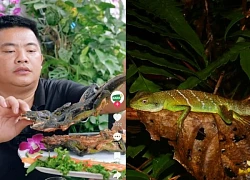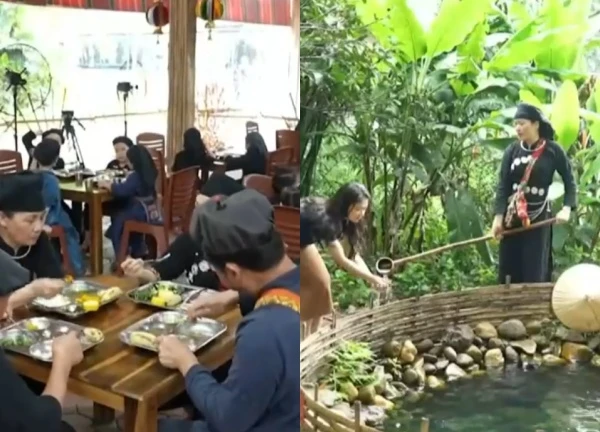The girl owns "oversized" hips, up to 163 cm in size, which makes fans lament

5 | 1 Discuss | Share
Hidden deep in the thick mud at the bottom of rivers and lakes in the wilds of West Africa, the West African lungfish (Protopterus annectens) is one of the most spectacular survival creatures in the natural world.
Unlike any other fish, they can survive years of dry season without a drop of water or any food source.
This strange fish seems to be able to “travel between two worldsâ€: it is both a typical aquatic resident and an amphibian on land. During the dry months, when the water recedes and living conditions become harsh, the West African lungfish burrows deep into the ground, creating a protective mud cocoon. There, it enters a special state of hibernation, where it almost stops all life activities, maintaining an extremely slow breathing rhythm with its primitive lungs.
What makes this fish special is not only its endurance but also its amazing biology. Unlike most fish that breathe only through their gills and are completely dependent on water to survive, the West African lungfish possesses both gills and a rudimentary pulmonary system, allowing it to absorb oxygen from the air. Tiny capillaries are densely distributed on the surface of its lungs, allowing for efficient gas exchange even in dry environments.
The existence of the West African lungfish is not only a living testament to the power of evolution, but also a clear warning: the wonders of nature are always fragile and vulnerable if humans do not know how to appreciate and protect them properly.
The West African lungfish (Protopterus annectens) is one of the most bizarre and impressive creatures in the natural world. It possesses an extraordinary ability to survive for years without water or food. This "beyond imagination" ability has left scientists and tourists from all over the world amazed and curious.
What makes the lungfish's survival ability so amazing is its double respiratory system. Unlike other fish that rely solely on gills to exchange oxygen in the water, the West African lungfish has both gills and a special organ that is very similar to the lungs of land animals. The dense blood vessel system covering the surface of the gills helps them absorb dissolved oxygen in the water like other fish. When living in a full water environment, oxygen will pass through the gills, penetrate into the blood through the capillaries, and then be transported throughout the body to maintain life.
However, what makes lungfish special is their ability to survive without water. During long dry spells, typical of West Africa, many lakes and rivers dry up, forcing the creatures to adapt or die. Lungfish can cope with this challenge by burrowing into the mud, creating a shell around their bodies, and then hibernating. At this point, they no longer use their gills and instead breathe through their lungs – an organ located in the gill cavity, allowing them to absorb oxygen directly from the air. They breathe by opening their nostrils – similar to the respiratory mechanism of land animals.
In fact, the "lungs" of the West African lungfish are not too different from those of reptiles, birds, or even mammals. These are organs used to exchange gases with the air environment. The combination of two respiratory mechanisms through gills in water and through lungs on land helps the lungfish flexibly adapt to harsh environmental changes, from flooded to dry, from full ponds to cracked land.
In addition to their ability to breathe on land, lungfish are also considered "living fossils" because they have many primitive characteristics. They belong to the subclass Dipnoi, and are closely related to lobe-finned fish, an ancient group of creatures believed to be the common ancestors of higher animals living on land today, including humans.
The existence of the West African lungfish is not only a biological wonder, but also a living testament to the evolution of life on Earth from water to land.
The West African lungfish (Protopterus annectens) is a living testament to the incredible power of nature and the incredible adaptability of life. Not only can it survive in water like most fish, this unique creature can also survive on land for long periods of time, up to years, without eating or drinking a single drop of water.
The secret lies in its rare ability to breathe twice: the West African lungfish has gills to breathe underwater, and lungs to absorb oxygen directly from the air. When the environment is still wet, they live like normal fish, using their gills to exchange gases. But when the dry season comes and the water dries up, the lungfish will dig a deep burrow in the mud, secrete a layer of mucus that covers its entire body, and then enter a special state of biological hibernation.
During hibernation, the fish's body almost "freezes" all activities. Metabolism is reduced to a minimum, heart rate and breathing are extremely slow, helping them consume very little energy. The primitive lungs at this time play a key role, helping the fish maintain life by breathing air like animals living on land. The outer layer of mucus helps to retain moisture and prevent dehydration, this is the "biological armor" that helps lungfish overcome the dry months.
Even more amazingly, the lungfish can maintain this state not just for a few weeks or months, but even for up to four years if conditions are not favorable. And when the rainy season returns and the water rises, the lungfish will wake up, break the shell, reabsorb the water, and return to normal life as if nothing had happened.
Not only outstanding for its survival ability, the appearance of the West African lungfish is also impressive. They have a long, round, plump body, covered with thick gray-brown scales. The large head, small eyes and wide mouth with sharp teeth make them look quite fierce, a perfect appearance for a "survival warrior" in the harsh nature.
However, over-exploitation, combined with environmental pollution and climate change, are putting this rare fish species in danger. Currently, the West African lungfish has been listed as endangered on the IUCN Red List, calling for urgent attention and conservation action from the international community.
The only real dragon in Vietnam, a series of tiktokers controversy over eating shrimp  Minh Lợi17:13:18 03/09/2024Shrimp is a reptile classified as a class V (a group that will be endangered) in the Red Book of Vietnam, so it needs to be protected. Recently, Hai Sapa caused controversy when he posted a clip of eating shrimp.
Minh Lợi17:13:18 03/09/2024Shrimp is a reptile classified as a class V (a group that will be endangered) in the Red Book of Vietnam, so it needs to be protected. Recently, Hai Sapa caused controversy when he posted a clip of eating shrimp.

5 | 1 Discuss | Share

5 | 0 Discuss | Share

4 | 0 Discuss | Share

1 | 0 Discuss | Share

3 | 0 Discuss | Share

4 | 0 Discuss | Share

3 | 0 Discuss | Share

4 | 0 Discuss | Share

4 | 0 Discuss | Share

1 | 0 Discuss | Share

4 | 0 Discuss | Share

2 | 0 Discuss | Share



4 | 0 Discuss | Report